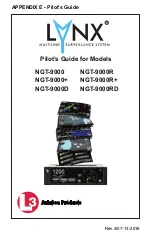
190-00769-00
GPS 10x Technical Specifications
Rev. A
Page 8
3
GPS 10X SOFTWARE INTERFACE
The interface protocol design of the GPS 10x product is based on the National Marine Electronics
Association’s NMEA 0183 ASCII interface specification. This standard is fully defined in
NMEA 0183,
Version 2.30
. Copies may be obtained from NMEA,
In addition to the standard NMEA 0183 sentences, the GPS 10x may also be configured to transmit
information over their serial interface using NMEA 0183 compliant Garmin proprietary sentences. These
proprietary sentences begin with the characters, “$PGRM”, instead of the characters “$G” that are typical
of the standard NMEA 0183 sentences. The characters “$P” indicate that the sentence is a proprietary
implementation and the characters and “GRM” indicate that it is Garmin’s proprietary sentence. The letter
(or letters) that follow the characters “$PGRM” uniquely identifies that particular Garmin proprietary
sentence.
It is also possible to configure the GPS 10x to transmit binary phase data information over their serial
interface. See Appendix A: Binary Phase Output Format for details.
The following sections describe the NMEA 0183 data format of each sentence transmitted and received by
the GPS 10x product.
3.1 RECEIVED NMEA 0183 SENTENCES
The following paragraphs define the sentences that can be received on the GPS sensor’s port. Null fields in
the configuration sentence indicate no change in the particular configuration parameter. All sentences
received by the GPS sensor must be terminated with <CR><LF>, the ASCII characters for carriage return
(0D hexadecimal) and line feed (0A hexadecimal). The checksum *hh is used for parity checking data and
is not required, but is recommended for use in environments containing high electromagnetic noise. It is
generally not required in normal PC environments. When used, the parity bytes (hh) are the ASCII
representation of the exclusive-or (XOR) sum of all the characters between the “$” and “*” characters, non-
inclusive. The hex representation must be a capital letter, such as 3D instead of 3d. Sentences may be
truncated by <CR><LF> after any data field and valid fields up to that point will be acted on by the sensor.
3.1.1 Additional Sensor Configuration Information (PGRMC1)
The $PGRMC1 sentence provides additional information used to configure the GPS sensor operation.
Configuration parameters are stored in non-volatile memory and retained between power cycles. The GPS
sensor will echo this sentence upon its receipt if no errors are detected. If an error is detected, the echoed
PGRMC1 sentence will contain the current default values. Current default values can also be obtained by
sending $PGRMC1E to the GPS sensor.
$PGRMC1,<1>,<2>,<3>,<4>,<5>,<6>,<7>,<8>,<9>,<10>,<11>,<12>*hh<CR><LF>
<11>
Auto Power Off, 1 = Off, 2 = On
<12>
Power On with External Charger, 1 = Off, 2 = On
Configuration changes take effect immediately, with the exception of Binary Phase Output Data, which
takes effect on the next power cycle or a reset event. If the GPS sensor is in the Binary data mode, it is
necessary to send the following eight-byte data stream to temporarily change the data format to NMEA
0183. Then follow by sending a PGRMC1 sentence that turns off the Binary Phase Output Data format:
10 0A 02 26 00 CE 10 03 (Hexadecimal)












































